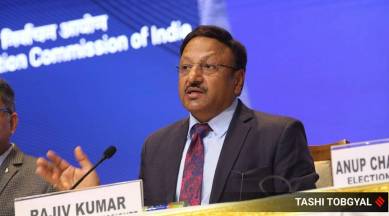Stay updated with the latest - Click here to follow us on Instagram
Gujarat sees shortest MCC for assembly polls in 20 years
MCC is enforced from the date the Election Commission announces the poll schedule and remains operational till the process of elections is completed, on December 10. EC keeps a tab on meetings, expenditure, public rallies, use or misuse of mass media, etc, during this period.

The elections to the Gujarat Assembly in December will see the Model Code of Conduct (MCC) being enforced for the shortest period—38 days—in at least the past 20 years in the state.
MCC is enforced from the date the Election Commission announces the poll schedule and remains operational till the process of elections is completed, on December 10. EC keeps a tab on meetings, expenditure, public rallies, use or misuse of mass media, etc, during this period. When quizzed on the shortened period of MCC for Gujarat, Chief Election Commissioner Rajiv Kumar said in Delhi, “In the general elections in Delhi, a similar period was given. The schedule was declared on January 14, 2020, and the date of completion was February 13—exactly 38 days. So it is not the first.”
monthly limit of free stories.
with an Express account.
Election Commission records show that MCC declared for Gujarat polls is the shortest in at least the past 20 years in the state. In December 2002, when polls were held in a single phase and EVMs were being used for the first time in the state, the period of MCC stretched for close to 50 days. It was the year when the assembly was dissolved prematurely in July 2002 and the BJP called for early polls.
In 2007, when state assembly elections were held in two phases with Kutch, Saurashtra and South Gujarat voting on a single day, and North and Central Gujarat on a different day, the period of MCC stretched to 78 days. In the past two decades, the 2012 assembly elections had the longest duration—83 days—of MCC. In 2017, MCC was only for 57 days.
When asked if a reduced MCC affects the election campaigning, Congress spokesperson in Gujarat, Manish Doshi, said, “The elections for both Himachal and Gujarat should have been announced together as counting for both states will be held on December 8. The time that we usually get for campaigning after the announcement of polls now stands reduced. But it will not hamper us as we started work for the polls in February with the Dwarka declaration.” The ‘Dwarka Declaration’—released in February after a three-day brain-storming (Chintan Shivir) session in the Gujarat town—showcased Congress’s vision for the state.
On the other hand, AAP has gone public with its list of 108 candidates even before the declaration of polls in the state.
Meanwhile, Dr Dhaval Patel, District Election Officer of Ahmedabad, Thursday said the EC has begun implementing MCC by removing symbols of political parties defacing public places. “A meeting of government officials associated with district administration was also held in which they briefed about the MCC guidelines applicable to them,” Patel said, while talking to media persons at the district collectorate.
In the first phase of polling in Gujarat on December 1, 89 constituencies in Kutch, Saurashtra and South Gujarat regions will go to vote. These include the districts of Kutch, Surendranagar, Morbi, Rajkot, Jamnagar, Devbhumi Dwarka, Porbandar, Junagadh, Gir Somnath, Amreli, Bhavnagar, Botad, Narmada, Bharuch, Surat, Tapi, Dangs, Navsari and Valsad.
In the second phase, the remaining 93 seats of North Gujarat and Central Gujarat, including the districts of Banaskantha, Patan, Mehsana, Sabarkantha, Aravalli, Gandhinagar, Ahmedabad, Anand, Kheda, Mahisagar, Panchmahal, Dahod, Vadodara and Chotta Udepur, will go to polls.